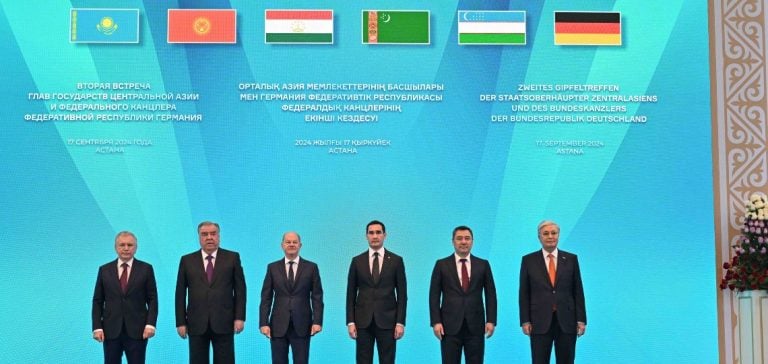Central Asian countries are positioning themselves as key players in the development of new trade and energy routes to Europe, in particular through closer collaboration with Germany.
During a historic visit by the German Chancellor, the region’s leaders expressed their desire to attract German investment in the energy sector and establish transport infrastructures that bypass Russia.
This dynamic is part of a changing geopolitical context, in which Central Asia is seeking to diversify its economic partnerships and strengthen its integration into global supply chains.
A call for energy investment
Kazakh President Kassym-Jomart Tokayev stresses the urgent need for greater integration of transport and logistics systems between Central Asia and Europe.
He emphasizes the need to develop a transport corridor that bypasses areas under sanctions, notably Russia and Iran.
This corridor, often referred to as the “Middle Corridor”, aims to establish a direct link between the region’s natural resources and European markets, facilitating the export of gas, oil and rare earths.
Says Tokayev:
“We’re counting on Germany’s help to link this route to the Trans-European Transport Network.”
Discussions around sustainable energy, particularly hydrogen, are also gaining momentum.
The resource-rich countries of Central Asia are planning to export low-environmental-impact energy to Europe.
This initiative is part of a wider drive to meet the challenges of decarbonization, while diversifying energy sources for the European continent.
The region’s leaders see Germany as a strategic partner in realizing these ambitions.
A region in search of international recognition
The German Chancellor’s visit comes at a time when Central Asia is seeking to strengthen its role on the international stage.
Kyrgyz President Sadyr Japarov points out that the region has considerable potential in terms of natural resources and green energy.
However, he also warns of the threats posed by climate change, calling for increased cooperation with Germany in this area.
Says Japarov:
“Our region has everything it needs to develop, but climate change is a serious threat to Central Asia.”
The Central Asian republics, historically under the influence of Russia, are seeking to establish more balanced relations with other powers, notably Germany and the European Union.
This desire for diversification is accentuated by recent geopolitical events, notably the invasion of Ukraine, which has redefined economic and political relations in the region.
The leaders of these countries are expressing their desire to interact with Germany to implement joint projects, thereby strengthening their regional economic integration.
The challenges of sustainable cooperation
Despite the opportunities, several challenges remain for the implementation of these projects.
The situation in Afghanistan, Central Asia’s neighbor, remains a cause for concern, particularly as regards regional stability and diplomatic relations with the Taliban.
Central Asian countries have to navigate in a complex environment, where security and economic development issues are closely intertwined.
The region’s leaders recognize the need for a collaborative approach to overcoming these challenges.
At the same time, the need for adequate infrastructure to support the development of transport corridors is crucial.
Investment in transport and energy infrastructure is essential to ensure that Central Asia’s resources can reach European markets efficiently and sustainably.
Discussions with Germany could pave the way for strategic partnerships, but also require a long-term commitment from the countries in the region.
A vision for the future
Development prospects for Central Asia are promising, but depend on solid international cooperation and a shared vision.
The region’s leaders are aware that their economic future depends on their ability to integrate into global supply chains while preserving their national interests.
Germany, as a major economic power, could play a decisive role in this transformation.
Recent discussions highlight the importance of a collaborative approach to economic and environmental challenges.
By aligning themselves with decarbonization and sustainability objectives, Central Asian countries can not only strengthen their position on the global market, but also contribute to a more responsible energy future for Europe.






















